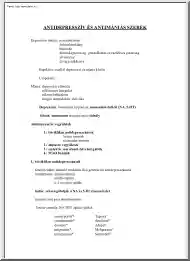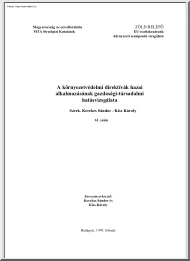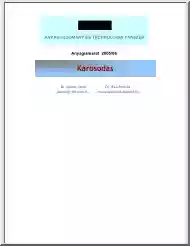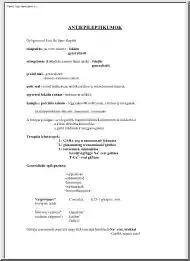A doksi online olvasásához kérlek jelentkezz be!
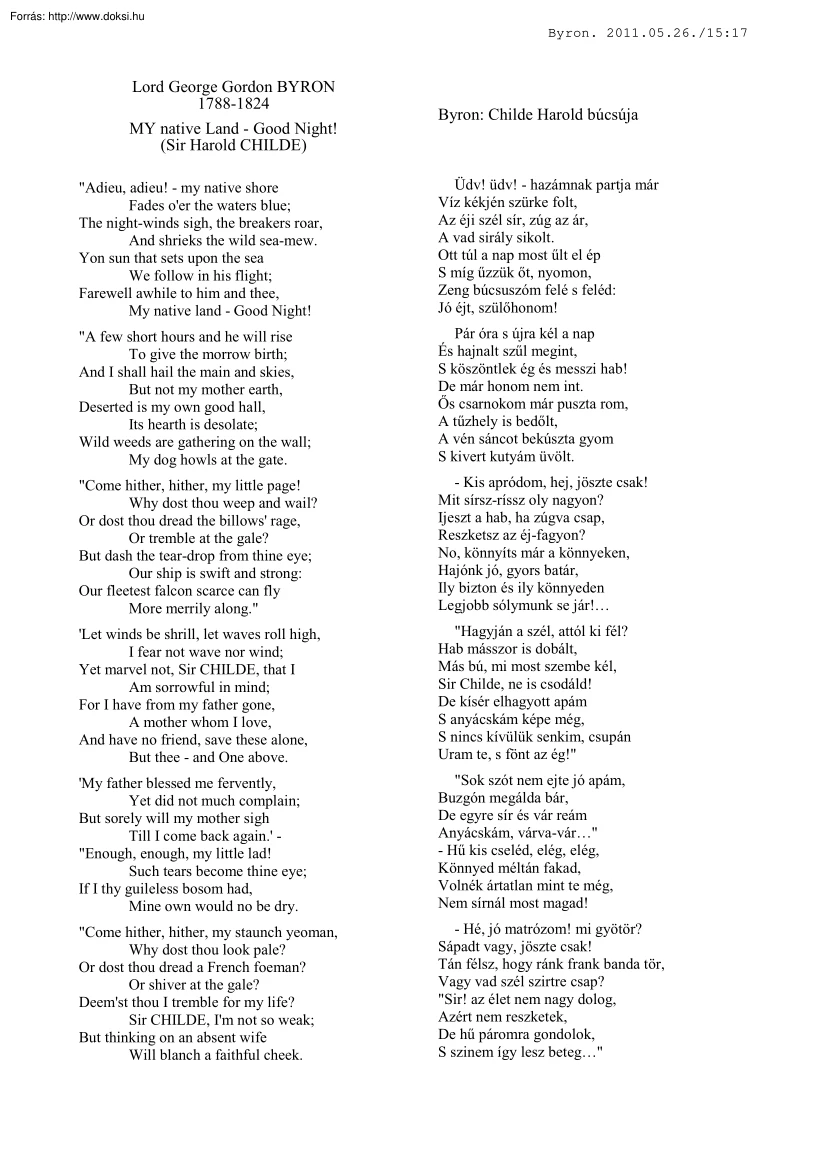
A doksi online olvasásához kérlek jelentkezz be!
Nincs még értékelés. Legyél Te az első!
Mit olvastak a többiek, ha ezzel végeztek?
Tartalmi kivonat
Byron. 20110526/15:17 Lord George Gordon BYRON 1788-1824 MY native Land - Good Night! (Sir Harold CHILDE) Byron: Childe Harold búcsúja "Adieu, adieu! - my native shore Fades o'er the waters blue; The night-winds sigh, the breakers roar, And shrieks the wild sea-mew. Yon sun that sets upon the sea We follow in his flight; Farewell awhile to him and thee, My native land - Good Night! Üdv! üdv! - hazámnak partja már Víz kékjén szürke folt, Az éji szél sír, zúg az ár, A vad sirály sikolt. Ott túl a nap most űlt el ép S míg űzzük őt, nyomon, Zeng búcsuszóm felé s feléd: Jó éjt, szülőhonom! "A few short hours and he will rise To give the morrow birth; And I shall hail the main and skies, But not my mother earth, Deserted is my own good hall, Its hearth is desolate; Wild weeds are gathering on the wall; My dog howls at the gate. Pár óra s újra kél a nap És hajnalt szűl megint, S köszöntlek ég és messzi hab! De már honom nem int.
Ős csarnokom már puszta rom, A tűzhely is bedőlt, A vén sáncot bekúszta gyom S kivert kutyám üvölt. "Come hither, hither, my little page! Why dost thou weep and wail? Or dost thou dread the billows' rage, Or tremble at the gale? But dash the tear-drop from thine eye; Our ship is swift and strong: Our fleetest falcon scarce can fly More merrily along." - Kis apródom, hej, jöszte csak! Mit sírsz-ríssz oly nagyon? Ijeszt a hab, ha zúgva csap, Reszketsz az éj-fagyon? No, könnyíts már a könnyeken, Hajónk jó, gyors batár, Ily bizton és ily könnyeden Legjobb sólymunk se jár! 'Let winds be shrill, let waves roll high, I fear not wave nor wind; Yet marvel not, Sir CHILDE, that I Am sorrowful in mind; For I have from my father gone, A mother whom I love, And have no friend, save these alone, But thee - and One above. "Hagyján a szél, attól ki fél? Hab másszor is dobált, Más bú, mi most szembe kél, Sir Childe, ne is csodáld! De
kísér elhagyott apám S anyácskám képe még, S nincs kívülük senkim, csupán Uram te, s fönt az ég!" 'My father blessed me fervently, Yet did not much complain; But sorely will my mother sigh Till I come back again.' "Enough, enough, my little lad! Such tears become thine eye; If I thy guileless bosom had, Mine own would no be dry. "Sok szót nem ejte jó apám, Buzgón megálda bár, De egyre sír és vár reám Anyácskám, várva-vár" - Hű kis cseléd, elég, elég, Könnyed méltán fakad, Volnék ártatlan mint te még, Nem sírnál most magad! "Come hither, hither, my staunch yeoman, Why dost thou look pale? Or dost thou dread a French foeman? Or shiver at the gale? Deem'st thou I tremble for my life? Sir CHILDE, I'm not so weak; But thinking on an absent wife Will blanch a faithful cheek. - Hé, jó matrózom! mi gyötör? Sápadt vagy, jöszte csak! Tán félsz, hogy ránk frank banda tör, Vagy vad szél szirtre
csap? "Sir! az élet nem nagy dolog, Azért nem reszketek, De hű páromra gondolok, S szinem így lesz beteg" Byron. 20110526/15:17 'My spouse and boys dwell near thy hall, Along the bordering lake, And when they on their father call, What answer shall she make? "Enough, enough, my yeoman good, Thy grief let none gainsay; But I who am of lighter mood, Will laugh to flee away. "Várad tövén, tópart-tanyán Vár nőm s a kis fiúk, Kérdik: hol jár apus, anyám? S jaj, választ ő se tud!" - Elég, elég, hű vagy s derék, Ha búsulsz, nem csoda, Hajh! én léhább szivet nyerék S vigan megyek tova! "For who would trust the seeming sighs Of wife or paramour? Fresh feres will dry the bright blue eyes We late saw streaming o'er. For pleasures past I do not grieve, Nor perils gathering near; My greatest grief is that I leave No thing that claims a tear. Én megvetem, bárhogy sohajt A csalfa nőnemet, Tudom, új láng szárítja majd A
könnyes, kék szemet. Tűnt kéjt siratni rest vagyok S utam bár vészt igér, Csak az fáj, hogy mit itt hagyok Még egy könnyet sem ér "And now I'm in the world alone, Upon the wide, wide sea; But why should I for others groan, When none will sigh for me? Perchance my dog will whine in vain, Till fed by stranger hands; But long ere I come back again, He'd tear me where he stands. Magam vagyok már e kerek Földön s e nagy vizen, Búm senkiért se kesereg, Mint értem senkisem. Ebem vonít tán még, szegény, De majd új koncra kap, S ha egyszer visszatérek én, Lehet, meg is harap "With thee, my bark, I'll swiftly go Athwart the foaming brine; Nor care what land thou bear'st me to, So not again to mine. Welcome, welcome, ye dark blue waves! And when you fail my sight, Welcome, welcome, ye deserts; and ye caves! My native Land - Good Night!" Hadd lengek hát bárkám veled, Hullámvölgyön s hegyen, Mindegy, mily föld partját leled,
Csak honom ne legyen! Üdv! üdv! éjkék hullámsereg! S ha tükrötök unom, Üdv! puszta sík s vad part-üreg! - Jóéjt, szülőhonom! Fordította: Tóth Árpád Byron. 20110526/15:17 absent adieu again alone along and answer are athwart away awhile back bark bear become billows birth blanch blessed blue bordering bosom boys breakers bright brine but call can care caves cheek childe claims come complain dark dash deem deserted deserts desolate did dog dost dread drop dry dwell earth enough ere eye eyes fades fail faithful falcon farewell father fear fed feres fervently few flee fleetest flight fly foaming foeman follow for french fresh friend from gainsay gale gate gathering give gone good greatest grief grieve groan guileless had hail hall hands have hearth high him his hither hours howls its lad lake land late laugh leave let life lighter little long look love main make marvel merrily mew mind mine mood more morrow mother much native near night none nor not now one
others our own page pale paramour past perchance perils pleasures rage rise roar roll save saw scarce sea seeming sets shall she ship shiver Byron. 20110526/15:17 shore short should shrieks shrill sigh sighs sight sir skies sorely sorrowful spouse stands staunch stranger streaming strong such sun swift swiftly tear tears that the thee their these they thine thing thinking thou thy till tremble trust upon vain wail wall waters wave waves weak weeds weep welcome what when where whine who whom why wide wife wild will wind winds with world would yeoman yet yon you . Kóta Béla
Ős csarnokom már puszta rom, A tűzhely is bedőlt, A vén sáncot bekúszta gyom S kivert kutyám üvölt. "Come hither, hither, my little page! Why dost thou weep and wail? Or dost thou dread the billows' rage, Or tremble at the gale? But dash the tear-drop from thine eye; Our ship is swift and strong: Our fleetest falcon scarce can fly More merrily along." - Kis apródom, hej, jöszte csak! Mit sírsz-ríssz oly nagyon? Ijeszt a hab, ha zúgva csap, Reszketsz az éj-fagyon? No, könnyíts már a könnyeken, Hajónk jó, gyors batár, Ily bizton és ily könnyeden Legjobb sólymunk se jár! 'Let winds be shrill, let waves roll high, I fear not wave nor wind; Yet marvel not, Sir CHILDE, that I Am sorrowful in mind; For I have from my father gone, A mother whom I love, And have no friend, save these alone, But thee - and One above. "Hagyján a szél, attól ki fél? Hab másszor is dobált, Más bú, mi most szembe kél, Sir Childe, ne is csodáld! De
kísér elhagyott apám S anyácskám képe még, S nincs kívülük senkim, csupán Uram te, s fönt az ég!" 'My father blessed me fervently, Yet did not much complain; But sorely will my mother sigh Till I come back again.' "Enough, enough, my little lad! Such tears become thine eye; If I thy guileless bosom had, Mine own would no be dry. "Sok szót nem ejte jó apám, Buzgón megálda bár, De egyre sír és vár reám Anyácskám, várva-vár" - Hű kis cseléd, elég, elég, Könnyed méltán fakad, Volnék ártatlan mint te még, Nem sírnál most magad! "Come hither, hither, my staunch yeoman, Why dost thou look pale? Or dost thou dread a French foeman? Or shiver at the gale? Deem'st thou I tremble for my life? Sir CHILDE, I'm not so weak; But thinking on an absent wife Will blanch a faithful cheek. - Hé, jó matrózom! mi gyötör? Sápadt vagy, jöszte csak! Tán félsz, hogy ránk frank banda tör, Vagy vad szél szirtre
csap? "Sir! az élet nem nagy dolog, Azért nem reszketek, De hű páromra gondolok, S szinem így lesz beteg" Byron. 20110526/15:17 'My spouse and boys dwell near thy hall, Along the bordering lake, And when they on their father call, What answer shall she make? "Enough, enough, my yeoman good, Thy grief let none gainsay; But I who am of lighter mood, Will laugh to flee away. "Várad tövén, tópart-tanyán Vár nőm s a kis fiúk, Kérdik: hol jár apus, anyám? S jaj, választ ő se tud!" - Elég, elég, hű vagy s derék, Ha búsulsz, nem csoda, Hajh! én léhább szivet nyerék S vigan megyek tova! "For who would trust the seeming sighs Of wife or paramour? Fresh feres will dry the bright blue eyes We late saw streaming o'er. For pleasures past I do not grieve, Nor perils gathering near; My greatest grief is that I leave No thing that claims a tear. Én megvetem, bárhogy sohajt A csalfa nőnemet, Tudom, új láng szárítja majd A
könnyes, kék szemet. Tűnt kéjt siratni rest vagyok S utam bár vészt igér, Csak az fáj, hogy mit itt hagyok Még egy könnyet sem ér "And now I'm in the world alone, Upon the wide, wide sea; But why should I for others groan, When none will sigh for me? Perchance my dog will whine in vain, Till fed by stranger hands; But long ere I come back again, He'd tear me where he stands. Magam vagyok már e kerek Földön s e nagy vizen, Búm senkiért se kesereg, Mint értem senkisem. Ebem vonít tán még, szegény, De majd új koncra kap, S ha egyszer visszatérek én, Lehet, meg is harap "With thee, my bark, I'll swiftly go Athwart the foaming brine; Nor care what land thou bear'st me to, So not again to mine. Welcome, welcome, ye dark blue waves! And when you fail my sight, Welcome, welcome, ye deserts; and ye caves! My native Land - Good Night!" Hadd lengek hát bárkám veled, Hullámvölgyön s hegyen, Mindegy, mily föld partját leled,
Csak honom ne legyen! Üdv! üdv! éjkék hullámsereg! S ha tükrötök unom, Üdv! puszta sík s vad part-üreg! - Jóéjt, szülőhonom! Fordította: Tóth Árpád Byron. 20110526/15:17 absent adieu again alone along and answer are athwart away awhile back bark bear become billows birth blanch blessed blue bordering bosom boys breakers bright brine but call can care caves cheek childe claims come complain dark dash deem deserted deserts desolate did dog dost dread drop dry dwell earth enough ere eye eyes fades fail faithful falcon farewell father fear fed feres fervently few flee fleetest flight fly foaming foeman follow for french fresh friend from gainsay gale gate gathering give gone good greatest grief grieve groan guileless had hail hall hands have hearth high him his hither hours howls its lad lake land late laugh leave let life lighter little long look love main make marvel merrily mew mind mine mood more morrow mother much native near night none nor not now one
others our own page pale paramour past perchance perils pleasures rage rise roar roll save saw scarce sea seeming sets shall she ship shiver Byron. 20110526/15:17 shore short should shrieks shrill sigh sighs sight sir skies sorely sorrowful spouse stands staunch stranger streaming strong such sun swift swiftly tear tears that the thee their these they thine thing thinking thou thy till tremble trust upon vain wail wall waters wave waves weak weeds weep welcome what when where whine who whom why wide wife wild will wind winds with world would yeoman yet yon you . Kóta Béla
